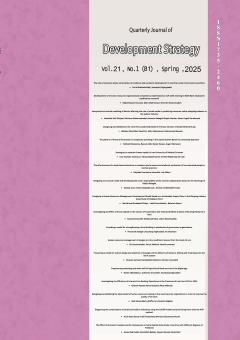Designing a structural model and developing the social responsibility of the Customs Organization based on the teachings of Nahjul-Balagha
Subject Areas : فرهنگیSiamak Azari 1 , Nima Ranjijafaroudi 2 * , Alireza Farokhbakht Foomani 3
1 - Department of public administration, Aa.C., Islamic Azad University, Astara, Iran.
2 - Department of public administration, BaA.C., Islamic Azad University, International Bandaranzali, Iran.
3 - Department of public administration, BaA.C., Islamic Azad University, International Bandaranzali, Iran.
Keywords: Social Responsibility, Customs Organization, Nahj al-Balagha.,
Abstract :
In the Holy Quran, God Almighty affirms the social nature of humanity. Accordingly, based on divine discourse, humans are social beings and must engage with society to live. This concept has been emphasized by Imam Ali (peace be upon him). The objective of this research is to design a model for the social responsibility structure of the Customs Organization based on the teachings of Nahj al-Balagha.This study employs a mixed-methods approach (qualitative and quantitative). Given the nature of the topic, the qualitative method used is content analysis, while the quantitative aspect employs a descriptive-correlational (survey) method. Therefore, concerning the research issue, the unit of analysis in this study consists of the texts of Nahj al-Balagha related to social responsibility within organizations.The qualitative population of this research is the book Nahj al-Balagha, and the sample includes all sermons and texts addressing social responsibility. The data collection tool employed consisted of specialized fiches for content analysis, through which relevant materials from Nahj al-Balagha were gathered and examined. Using quantitative content analysis methods, a coding guideline based on the themes and objectives of the research was developed. Accordingly, the relevant texts were extracted and coded.In the quantitative section, the entire staff and managers of the Customs Administration of the country constituted the population. Based on Morgan’s table, a sample of 383 individuals was randomly selected using stratified sampling. A researcher-constructed questionnaire with 72 items utilizing a Likert scale was used for analysis. The responses were analyzed using Structural Equation Modeling (SEM) with SPSS and Lisrel software. According to the orthogonal rotation method (Varimax rotation), all identified factors can be classified as dimensions of social responsibility based on the teachings of Nahj al-Balagha.
منابع
*قرآن کریم. ترجمه: مهدی الهى قمشه ای.
* نهج البلاغه. ترجمه: محمد دشتى
بوستاني، حميدرضا؛ بانشي، عبادالله؛ شاكري، احمد (1396). اولويت بندي مؤلفه هاي فرهنگ سازماني از منظر نهج البلاغه در دانشگاه اسلامي، فصلنامه مديريت در دانشگاه اسلامي، 6 (1)، 61-78
حاجيها، زهره؛ سرافزار، بهمن (1393). بررسي رابطه بين مسئوليت پذيري اجتماعي شركتها و هزينه حقوق صاحبان سهام در شركت هاي پذيرفته شده در بورس اوراق بهادار تهران، فصلنامه پژوهشهاي تجربي حسابداري، 4 (14)، 105-123.
حیدری، محمدشریف؛ و ساجدی، ابوالفضل(1392)، موانع تربیت اجتماعی کودکان در خانواده¬های امروزی، معرفت، (194)، 115-133.
دانایی فرد،حسن؛ بوستانی، حمیدرضا؛ شاکری، ساناز و ذکی، مهدی (1399)، مضمونکاوی مسئولیت اجتماعی سازمان از دیدگاه آیات و روایات: دلالتهایی برای دانشگاههای جامعه اسلامی، فصلنامه مطالعات منابع انسانی، 10، 4 ، 145-118.
دیدگاه، زهرا؛ شریعتی، سیدصدرالدین؛ بهشتی، سعید؛ و ایمانی نائینی، محسن(1397)، تبیین نقش مسئولیت¬پذیری در تربیت اجتماعی نوجوانان براساس تفسیرالمیزان، فرهنگ مشاوره و روان-درمانی، (34)، 27-56.
رضوان خواه، سلمان؛ صالحی، اکبر و سجادی، سیدمرتضی (1399)، مسئولیت های اجتماعی انسان از منظر امام علی (ع) با تاکید بر نهج البلاغه و نقش تعلیم و تربیت در تحقق آن ها، اسلام و مطالعات اجتماعی، 8 ، 1 (پیاپی 29)، 8 - 35 .
رونقي، محمدحسين (1398). رابطه اخلاق حرفه اي اسلامي و مسئوليت پذيري اجتماعي بر سرمايه اجتماعي . فصلنامه مديريت اسلامي27 (3) ،184 -163.
طالب¬نیا، قدرت¬الله؛ رجب¬دری، حسین؛ خانی¬ذلان، امیررضا(1397)، بررسی عوامل مؤثر بر مسئولیت-پذیری اجتماعی شرکت¬ها از دیدگاه اسلامی، فصلنامه مدیریت اسلامی، 26(2)، 183-211.
عابدی، منیره؛ و نیلی، محمدرضا(1392)، بررسی تحلیلی اهداف تربیت اجتماعی آموزش و پرورش ایران و مقایسه آن با دیدگاههای علامه طباطبایی، تربیت اسلامی، (16)، 79-100.
عباسی، آمنه (1393)،مسئولیت پذیری اجتماعی در نهج البلاغه،کنگره بین المللی فرهنگ و اندیشه دینی،قم.
عمرانی، سیدمسعود؛ افسردیر، حسن و سادات عمرانی، مرجان(1394)، راهکارهای تربیت اجتماعی و عاطفی نوجوانان در قرآن و احادیث، پژوهشنامه معارف قرآنی، (23)، 7-34.
فروغی، داریوش و میرشمس شهشهانی، مرتضی و پورحسین، سمیه (1387)، «نگرش مدیران درباره افشای اطلاعات حسابداری اجتماعی: شرکتهای پذیرفته شده در بورس اوراق بهادار تهران»، بررسی های حسابداری و حسابرسی، 15، 52، 55 – 70
هنری لطیف پور، یدالله و عروتی موفق، اکبر (1399)، مسئولیت جمعی از نگاه امام علی(ع) در نهج البلاغه، فصلنامه علوم سیاسی، 23، 92 ، 24-50.
Bovens, M.A.P. (2016), "Verantwoordelijkheid en organisatie: beschouwingen over ansprakelijkheid, institutioneel burgerschap enambtelijke ongehoorzaamheid", Tjeenk willink,
Dusuki, A. W., & Abdullah, N. I. (2007). Maqasid al-shariah, maslahah and corporate social responsibility. The American Journal of Islamic Social Sciences, 24 (1), 25-45.
Fisscher, O., and Nijhof, A. (2015), "Implication of business ethics for quality management", The TQM Magazine, 17 (2), 150-160.
Riaz Mir, U., Hassan, S. M. & Hassan, S. S. (2015). Islamic Perspective of Corporate Social Responsibility. Islamic Perspective of Corporate, 46 (31), 77-90.
World health organization. (2009). the life skills education project Geneva.Who technical report series.

